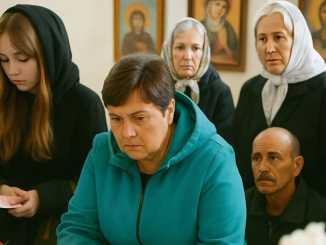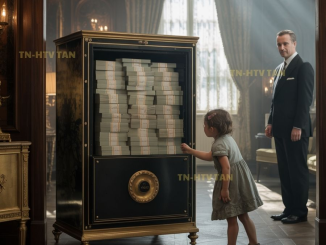
At first I thought it was just a weird angle. You know how kids wedge themselves into corners like cats. But no—my nephew Arman was straight-up hovering, his back pressed to the kitchen wall, one foot crossed, calmly writing on a notepad.
Not a wobble. Not a grunt. Just sitting in thin air like it was a chair.
“Arman,” I said, stepping closer. “What are you doing?”
He didn’t look up. “Almost done. I have to write it down exactly how I heard it.”
He handed me the paper without blinking.
It was a rough sketch of something that looked like symbols and musical notes, but in between them were lines written in his messy eight-year-old handwriting: “Tell him to go back. He doesn’t belong here yet.”
I stared at the paper. My heart did this little jump, like it was trying to get my attention. “Who told you this?”
Arman shrugged, his eyes following something over my shoulder. “The man in the corner. He said you were about to make a big mistake.”
There was nothing behind me but the fridge and some cereal boxes. I turned back to him. “What mistake?”
“He didn’t say. But he said to show you this before you decide.”
And just like that, Arman dropped to the floor with a soft thud, like someone let go of invisible strings. He blinked, looked around like he’d just woken up from a nap, and then asked if we could have ice cream.
I didn’t know what to say. My sister—Arman’s mom—was due to pick him up in an hour. She never liked when I fed him too much sugar, but suddenly that felt like the least of my concerns.
I gave him a bowl of vanilla and sat at the table, staring at the paper.
The words haunted me: “Tell him to go back. He doesn’t belong here yet.”
What did that mean?
I hadn’t told anyone, but I was planning something that afternoon. Something reckless. The kind of reckless that wears a nice suit and looks like closure.
I was going to visit my dad.
More specifically, I was going to visit my dad’s grave. But not just visit—no. I was going to dig something up.
A small tin box, buried behind the headstone. One that only he and I knew about.
It held a few things—old letters, a necklace, and a note that simply read, “If you read this, it means you’re finally ready to know.”
I had been twelve when he gave it to me. Said it would make sense “when you’re older.” He died two years later in a freak accident at work. Everyone called it an accident. But my gut never did.
I had spent over a decade ignoring that box, convincing myself it was just sentimental. But something had changed in the past week. I kept dreaming of him, always the same phrase: “It’s time.”
And now here was my nephew, floating like a monk, telling me someone said I was about to make a mistake.
Maybe the box wasn’t meant to be opened. Or maybe someone—or something—was trying to stop me.
I didn’t tell Arman any of this. I just asked him what he meant by the man in the corner.
“I don’t know,” he said with a shrug. “He looked tired. Like you.”
Ouch.
My sister came, picked him up, and gave me the usual warning about screen time and bedtime snacks. I nodded, half-listening. I kept the drawing in my pocket.
That evening, I drove to the cemetery with a shovel in the trunk. It was late—close to 10 PM. I parked by the side gate and walked in, hoodie up, hands cold.
My dad’s grave looked exactly the same. Simple. No flowers, no frills. Just his name, the dates, and a quote he used to say: “You don’t have to be right. Just honest.”
I stood there for a while, wondering if I really wanted to go through with it.
Then I looked around, pulled out the shovel, and started digging.
The earth gave way easily. Soft from rain earlier in the week. Five minutes in, the shovel hit metal.
I paused, wiped my hands on my jeans, and dug around the box.
It was exactly how I remembered it. Rusted on the corners. My name scratched into the lid.
I opened it.
Letters. Photos. His old ring. And then—the note.
It wasn’t the same as I remembered.
It now read: “You’re not ready yet. Go back.”
I stared at it.
Had I imagined the original message? I swore it said something about being ready. I swore I’d read it before. But this—this felt different. Like someone had changed it.
That’s when I heard it.
A voice. Low, calm. Familiar.
“You always were stubborn.”
I turned.
No one.
But I felt something. A presence. The kind you feel when someone walks into the room, even if they’re silent. The air got heavier.
“Dad?” I said, my voice shaking.
Silence.
Then a whisper, just above the wind: “Not yet.”
I should’ve left then. But I didn’t. I dug deeper into the box, found a small envelope at the bottom. Unmarked. Sealed.
Inside was a photograph of a woman I’d never seen before. She looked young—maybe early thirties. Holding a baby.
On the back: “Tell him he has a brother.”
I nearly dropped it.
I was an only child. Or so I’d always thought.
I put everything back in the box, took it with me, and left the grave like someone running from their own reflection.
That night, I couldn’t sleep.
Who was the woman? And the baby? And why was my dad hiding this?
I called my mom the next day.
She went quiet on the phone when I asked.
Then she said, “I was hoping you’d never find out.”
I drove over. She made coffee like it was a normal day, but I could tell something in her had shifted. She sat across from me, sighed, and finally told me the truth.
Before he met my mom, my dad had a brief relationship with a woman named Leyla. They were young, wild, and barely held together by love or responsibility. Leyla got pregnant. My dad panicked. He was barely twenty.
He left. Never looked back.
Years later, he met my mom. When I was born, he tried to be better. But guilt followed him.
When he died, my mom found a letter he had written but never sent. It talked about making amends, reaching out, telling me the truth.
She didn’t have the heart to open that door.
I understood. But I couldn’t ignore it now.
Over the next few weeks, I did some digging. Literally and metaphorically.
I found Leyla. She’d passed away two years earlier from cancer.
But the baby—my brother—was alive.
His name was Kian. Twenty-two. Worked at a community center in another city. No social media. No real trail. But I found him.
And I drove out there.
I stood outside the center for almost half an hour, watching him through the window. He looked so much like our dad. The same posture. The same way he rubbed the back of his neck when he was thinking.
I introduced myself as a volunteer. He smiled, shook my hand. Warm eyes.
We worked side by side that day, sorting donated clothes, laughing about how people kept sending in single shoes and old prom dresses.
At one point, he looked at me and said, “You remind me of someone. No idea who.”
I almost told him. But I didn’t.
Not yet.
That night, I cried in my car.
There was so much he didn’t know. So much I wanted to say.
But something held me back. Maybe it was fear. Maybe it was respect.
Over the next few months, we became friends. I visited often. Helped out at the center. We’d grab burgers after work, talk about music, our dads—without him knowing we had the same one.
Then one day, it happened.
Arman saw a picture of Kian on my fridge. He pointed at it and said, “Oh! That’s the guy from the corner!”
I froze.
“What do you mean?” I asked.
“He’s the one who told me to write that message. He was floating too.”
I looked at Arman. He wasn’t joking. Kids have this way of saying the most insane things with a straight face. But I knew him. He wasn’t lying.
I called my mom that night. Told her everything.
She cried. Said maybe it was time.
A week later, I sat with Kian on a park bench.
I told him everything.
From the grave to the floating nephew to the box.
He didn’t believe me. Not at first.
But then he looked down at the ring on my finger—our dad’s old ring—and said, “He used to wear one just like that.”
I handed him the photograph.
He stared at it for a long time. Said nothing. Then nodded.
“I always felt like something was missing,” he whispered.
We hugged. Two strangers connected by blood, guilt, and something else—fate, maybe.
We still talk every week.
He came over for Arman’s birthday.
My sister cried when I told her who he was. Said he looked like Dad, and that he smiled the same way.
Arman said the man in the corner hasn’t come back since.
Maybe he didn’t need to.
Sometimes we carry the weight of secrets, thinking we’re protecting others. But the truth—it has a way of rising, like steam from a cup left too long.
And sometimes, kids float off the floor just to deliver a message we refuse to hear.
Life has a strange rhythm. It doesn’t always make sense in the moment. But if you listen closely, really listen, it tries to guide you.
All I know is this: Don’t wait for ghosts to tell you what your heart already knows.
Share this story if it made you feel something.
Maybe someone out there needs to remember—it’s never too late to reach out, forgive, or finally understand.






Leave a Reply